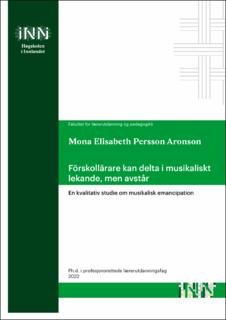| dc.contributor.author | Aronson, Mona Elisabeth Persson | |
| dc.date.accessioned | 2022-03-30T08:38:19Z | |
| dc.date.available | 2022-03-30T08:38:19Z | |
| dc.date.issued | 2022 | |
| dc.identifier.isbn | 978-82-8380-337-2 | |
| dc.identifier.isbn | 978-82-8380-338-9 | |
| dc.identifier.issn | 2464-4390 | |
| dc.identifier.issn | 2464-4404 | |
| dc.identifier.uri | https://hdl.handle.net/11250/2988512 | |
| dc.description | © Mona Elisabeth Persson Aronson 2022 | en_US |
| dc.description.abstract | Inom den svenska och norska förskolan förstås ofta musik som en praktik som bör följa vissa normativa antaganden om rösten och dess ljud. Den framförliggande avhandlingen ifrågasätter dessa normativa antaganden då den undersöker hur förskollärare och förskollärarutbildare uppfattar musikalisk lek. Musikalisk lek kan förstås som ett spontant musikaliskt utforskande och som en sorts kommunikation som individer kan delta i genom att använda sin röst och sin kropp. Musikalisk lek kan överraska och den kan utvecklas genom samspel med andra. Eftersom musikalisk lek kan möjliggöra en upplevelse av frihet och emancipation så har denna avhandling som syfte att öka kunskapen om vad som hindrar eller möjliggör för förskollärare och förskollärarutbildare att delta i musikaliskt lekande. Data samlades in med hjälp av iscensatt musikaliskt lekande under träffar med förskollärare och förskollärarutbildare, vid vilka jag deltog aktivt. Deltagarna hämtade sedan inspiration från dessa sessioner då de deltog i gemensamma gruppdiskussioner och beskrev sin förståelse av musikalisk lek. Diskussionerna spelades in, transkriberades och analyserades genom en reflektiv och tematisk analys. Resultaten visade att deltagarna delvis sade emot sig själva då de beskrev sin egen entusiastiska delaktighet i musikalisk lek och de begränsade möjligheterna för musikalisk lek i förskolan och i förskollärarutbildningar. Förskollärare och förskollärarutbildare kan delta i musikalisk lek, men de väljer att avstå. Jag drar slutsatsen att förskollärare och förskollärarutbildare hindras från att delta i musikalisk lek av att de uttrycker en repressiv argumentation som gör gällande att enbart vissa särskilt lämpade individer kan och bör skapa musik. Deltagarna hävdar också att syftet med musik i förskolan är att skapa gemensam sång och därigenom en form av konsensus, medan de betraktar musikaliskt lekande som ett lättsinnigt nöje. Avhandlingens resultat visar således att det är svårt att delta i musikalisk lek i både förskolor och förskollärarutbildningar på grund av vissa normativa föreställningar. Med inspiration från Habermas och Rancière utvecklar jag, i avhandlingens diskussionsavsnitt, en teoretisk förståelse för hur ett annorlunda sätt att resonera kan möjliggöra för musikalisk lek i förskolan och i förskollärarutbildningar. | en_US |
| dc.description.abstract | Abstract:
Music in preschool is generally understood as a practice that ought to be governed by normative presuppositions about voices and sounds. The current dissertation questions this normative stance by examining the views of preschool teachers and preschool-teacher educators on musical play. Musical play can be understood as a spontaneous musical exploration and form of communication that an individual conveys through his or her voice and body. Musical play can be surprising, and it can evolve through interaction with others. Noting the emancipatory possibilities inherent in musical play, the current dissertation aims to provide more knowledge about what facilitates and what impedes musical play among preschool teachers and preschool-teacher educators. Data were collected through orchestrated sessions of musical play during meetings with preschool teachers and preschool-teacher educators, respectively, where I as a researcher actively participated. Informed by their experiences from the musical-play sessions, the preschool teachers and preschool-teacher educators discussed their understandings of musical play in subsequent group talks. The discussions were recorded, transcribed, and analysed through a qualitative and reflective thematic analysis. The results indicated that the participants provided contradictory accounts of their own enthusiastic musical play and the difficulties of having musical play in preschool and preschool-teacher education. Preschool teachers and preschool-teacher educators are able to participate in musical play, but they choose to abstain. I conclude that both the preschool teachers and the preschool-teacher educators are hindered from participating in musical play by their reiteration of a repressive argumentation that suggests that only some distinguished individuals are able to create music. Furthermore, the participants suggested that the purpose of music in preschool is to create communal singing and consensus, while they considered musical play as merely frivolous. The results of the current dissertation highlight that it is difficult to engage in musical play in both preschools and preschool-teacher education due to this argumentation and these normative restraints. Inspired by Habermas’ and Rancière’s theoretical oeuvres, the dissertation theorizes about ways of reasoning that may facilitate musical play in preschool and in preschool-teacher education. | en_US |
| dc.language.iso | swe | en_US |
| dc.publisher | Høgskolen i Innlandet | en_US |
| dc.relation.ispartofseries | Ph.d.-avhandling i profesjonsrettede lærerutdanningsfag;25 | |
| dc.relation.ispartofseries | PhD in Teaching and Teacher Education;25 | |
| dc.subject | musikalsk lek | en_US |
| dc.subject | førskolelærere | en_US |
| dc.subject | førskolelærerutdanning | en_US |
| dc.subject | preschool teachers | en_US |
| dc.subject | musical play | en_US |
| dc.subject | preschool-teacher education | en_US |
| dc.title | Förskollärare kan delta i musikaliskt lekande, men avstår: en kvalitativ studie om musikalisk emancipation | en_US |
| dc.type | Doctoral thesis | en_US |
| dc.description.version | publishedVersion | en_US |
| dc.subject.nsi | VDP::Samfunnsvitenskap: 200::Pedagogiske fag: 280 | en_US |
| dc.source.pagenumber | 241 | en_US |
